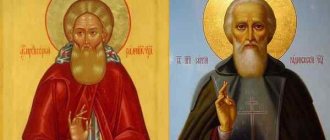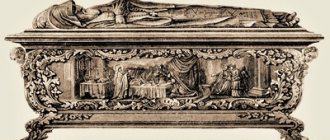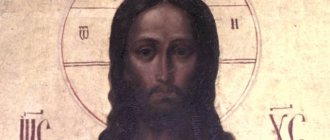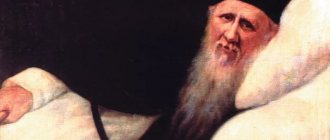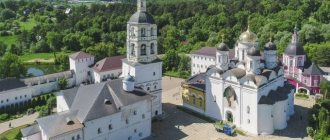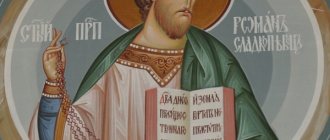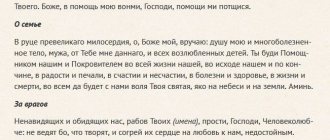"Save me, God!".
Thank you for visiting our website, before you start studying the information, please subscribe to our Orthodox community on Instagram, Lord, Save and Preserve † - https://www.instagram.com/spasi.gospodi/. The community has more than 60,000 subscribers. There are many of us like-minded people and we are growing quickly, we post prayers, sayings of saints, prayer requests, and timely post useful information about holidays and Orthodox events... Subscribe. Guardian Angel to you!
Paphnutius Borovsky, he, like others, deserved his inclusion in the list of saints, at the cost of his life. He had the gift of prophecy and foresaw his death. Memorial Day falls on May 14th. A large number of pilgrims strive to get there on this day to perform a miracle.
Prayer to St. Paphnutius Borovsky the Wonderworker
“O sacred head, earthly angel, heavenly man, great miracle worker, reverend our father Paphnutius! We earnestly resort to you with faith and love and tenderly ask: show us humble and sinners your holy and powerful intercession. We do not dare, for our sake, with the freedom of the children of God, to ask our Lord and Master for mercy and forgiveness. But to you, the prayer book is favorable to him, we offer and pray, ask us from his goodness for gifts that are useful and saving for our souls: rightful faith, strong piety, true repentance, forgiveness of sins, a perfect life, decisive correction, and turning from evil deeds to pleasing God, otherwise we do not anger the Lord by violating his holy commandments. Pray, holy of God, to the Most High Creator to grant peace and piety to our Orthodox country. Preserve, servant of Christ, your holy abode, created by you, and all who live and labor in it are free from all evil. Look mercifully at the people who come running to you, and fulfill all their requests for good. For all of us, spiritual and physical health, fruitfulness of the earth, a quiet and pleasing life, a good, Christian death and a good answer at the Last Judgment from the All-Merciful God, as you truly have great boldness towards him. To her, father, we know how much your prayer can do before the face of the Almighty Lord, and nothing is impossible for your intercession, unless you only desire it: for this reason, we firmly trust in you and greatly hope for your holy prayers, as if you will lead us through your intercession to a quiet refuge of salvation and the heirs of the bright Kingdom of Christ will appear. Do not disgrace our hope, miracle-working saint. And grant us, together with you, the bliss of heaven, let us glorify, praise and magnify the great mercy towards us of the Lover of Mankind, God, the Father and the Son and the Holy Spirit, and your good, fatherly intercession forever and ever. Amen."
Russian miracle worker, grandson of a Baskak
On May 1/14, the Russian Orthodox Church celebrates the memory of St. Paphnutius, the miracle worker of Borovsk. Saint Paphnutius ended his arduous ascetic life exactly 540 years ago.
The Monk Paphnutius had one of the most curious characters in ancient Russian monasticism, one of the most unique and strong characters known in ancient Rus'.
Vasily Klyuchevskoy
Grandson of a Baskak and student of St. Nikita of Serpukhov
Icon of St. Paphnutius of Borovsky
The Monk Paphnutius was the great-grandson of the Baskak of Vladimir Rus' (tax collector for the Golden Horde) Amyrkhan (XIII century), the grandfather of the future saint was also a Baskak - he converted to Orthodoxy with the name Martin. The monk was born in 1394 into the family of John and Photinia, who were distinguished by their love of strangers and fear of God, and was named Parthenius. His parents raised him in love for the Church and piety. At the age of 20, with their blessing, he took monastic vows with the name Paphnutius at the Intercession Monastery near Borovsk. He was given under the guidance of the disciple of St. Sergius of Radonezh, Saint Nikita of Serpukhov, with whom he remained in obedience for seven years, learning monastic life and monastic virtues.
In 1426, Saint Photius, Metropolitan of Kiev and All Rus', ordained the monk to the priesthood. For his humility and kindness, Paphnutius acquired the general love and respect of the brethren, and after the death of Abbot Markellus, he was unanimously elected abbot of the Vysoko-Pokrovsky monastery, where he was abbot and confessor for 33 years.
In the 51st year of his life, the Monk Paphnutius became seriously ill, left his abbess and accepted the great schema. Having miraculously healed on the feast of the Great Martyr George the Victorious, on April 23, 1444, the monk left the monastery with one of his disciples and settled on the left bank of the Protva River, at the confluence of the Isterma River - here he founded the Borovsky Monastery in honor of the Nativity of the Most Holy Theotokos. Soon those wishing to strive and seeking his spiritual guidance began to come to him. Each person who came had to build a cell for himself and then carry out obedience along with the others.
“No one had come to worship services or labor obediences before him”
From the founding of the monastery, the monk bore all the labors and obediences, setting an example for the brethren, being the first to rise and the last to go to sleep. As Saint Vassian writes, “no one before him came to divine services and to labor obediences”; at the same time, “the Monk Paphnutius was skilled in every human endeavor.” During the construction of a new stone church, he “carried stones and water on his shoulders,” he himself dug the ground for the monastery fence, carried logs and chopped wood, and devoted his free time from these works to reading spiritual books and weaving fishing nets.
The monk ate nothing on Wednesday and Friday, but on ordinary days he made do with the coarsest and simplest food: “his food was to please the brethren.” He was extremely simple, dressed in old, worn-out clothes - “a robe, duckweed, sheepskin and sandals, which none of those asking would take.” When a “proud man” entered the monastery, he, not recognizing the abbot, roughly pushed him, asking for the abbot.
View of the Pafnutiev Borovsky Monastery from a helicopter
The Monk Paphnutius called alms the “queen of virtues” and said that she could save those who had no other virtues from hell. When there was a severe famine in the area, the saint blessed the brethren to feed everyone who came indiscriminately, and sometimes up to a thousand people were fed in the monastery. And today few people can afford this, but for that time it was unprecedented. The brethren who grumbled at such extravagance, he pointed to examples of hospitable people who received rewards after the grave: the Grand Duke of Moscow Ivan Kalita, who distributed alms to all the poor without refusal, and one Mohammedan, whom the Lord, for his many alms, delivered from the torments of hell, leading him to Orthodoxy . The monastery's reserves from exorbitant alms were greatly depleted and the brethren were in need, but through the prayers of the Borovsky miracle worker, the following year the Lord sent the monastery an unprecedented harvest, much greater than what was harvested in ordinary times.
Borovsky miracle worker
Nesterov Mikhail Vasilievich “Saint Paphnutius Borovsky” 1890 State Russian Museum, St. Petersburg
As the chronicler writes, “Reverend Paphnutius was gentle and patient in his needs,” always unshakably believing in God’s help. One day on Easter there was no fish at all in the monastery. The brethren were very saddened by this and grumbled at their abbot. On the evening of Holy Saturday, the sexton went to a small spring to draw water for the Liturgy and suddenly saw countless “sizhki”, whom, through the prayers of the monk, the Lord sent to the monastery. At one time, the brethren caught so much fish that it was enough for a festive meal and a treat for numerous pilgrims throughout Bright Week.
Another time, the Monk Paphnutius asked one prince to fish for three days on his lands on the Oka River, so that everything caught would go to the benefit of the monastery. Before this, the prince's servants returned for a long time with a very meager catch. Knowing this, the prince agreed. Sending the steward out to fish, the monk ordered him to be given five hryvnia to buy large vessels in which to salt the fish that were to be caught. He did not take the money, not even hoping for a small catch. But the abbot strictly ordered to do as ordered. He obeyed and, lamenting the wasted money, went to do what he was told. Imagine his surprise when in three days 730 large fish were caught for the monastery - more than the prince’s fishermen caught during the entire summer.
The holy man also recognized the secret and long-standing sins of people whom he saw for the first time
The Monk Paphnutius had the gift of clairvoyance and by the face of the monk he recognized his spiritual state, whether or not he fulfilled the prayer rule laid down for the day; The holy man also recognized the secret and long-standing sins of the people whom he saw for the first time.
One day one of his students had a severe eye problem. The monk gave him his rosary and ordered him to say the Jesus Prayer a thousand times. Due to severe pain, he was only able to speak half, but this was enough for the eye to be completely healed. In joy, the disciple rushed to the abbot to tell him about his recovery, and he, having glorified God, ordered him to return to his cell and read the commanded number of prayers.
Sunday at Borovsky Monastery
Another time, as recorded in the chronicle, “one grumbling brother, who blasphemed everything that was happening in the monastery and the saint himself, had the following vision in a dream: as if he was standing in the middle of a church with singers, the Monk Paphnutius suddenly came into it and, looking at him, angrily says: “This one is a blasphemer: take him out of the church.” And immediately two black Ethiopians grabbed him, dragged him out and beat him severely. Waking up, the brother felt great fear and with tears in his eyes hurried to the monk to ask for his forgiveness.”
The Monk Paphnutius looked at young Vassian and said with a smile: “This one is the Simonov Archimandrite.”
One night, thieves came to the monastery, stole three monastery oxen and ran away. But unexpectedly for themselves, they got lost in the forest and, “like the blind,” walked around the monastery. When morning came, they abandoned the oxen and wanted to run, but “the invisible power of God bound them,” and they stood obediently until the brethren found them and brought them to the monk. He did not hand them over to the authorities, but ordered them to be fed and released in peace.
One day, pious laymen told the monk and the brethren gathered in his cell that the Simonov Monastery was left without an archimandrite; they began to speculate who would be his deputy: one named such and such, the other named someone else. The saint, looking at his young newly tonsured disciple Vassian (the future saint), pointed to him and said with a smile: “This one is Simonov’s archimandrite.” Many years later, he actually became the archimandrite of the Simonov Monastery.
Hegumen, whom demons feared and princes revered
The fame of the high spiritual life of the Borovsky abbot spread far around, and many pilgrims and petitioners from all over Russia began to flock to the monastery.
The Monk Paphnutius loved the simple people and called them his brothers. And with people of high rank, princes and boyars who sought his spiritual protection, he communicated without flattery or people-pleasing, sometimes strictly denouncing their morals and vices. The Monk Joseph of Volotsky wrote that when necessary, the Borovsky abbot was merciful and condescending, but sometimes he was stern and angry if necessary.
In the name of the chastity of the brethren, the Monk Paphnutius forbade the entry of women into the monastery, not allowing them even to approach the gates of the monastery, and the brethren strictly forbade any talk about them.
Once the wife of the famous noble boyar Alexei Gubarin became seriously ill and, in a fever, began to see frightening demons that severely tormented and frightened the unfortunate woman. When the torment became unbearable, a hunched, short old man with a large gray beard and poor clothes appeared to her and powerfully drove away the demons, after which she felt healthy again. Attacks happened to the noblewoman many times, and the elder always appeared and drove away the tormentors. One day, during another attack, the patient heard a voice telling her: “Paphnutius, who is in Borovsk, delivers you from demons.” After this, she completely recovered and wished to see the monk to find out whether he really appeared to her. The noblewoman came with her servants to the monastery. But since the monastery was closed to women, she sent servants to the disciples of the monk with a request to meet with him. The monks ordered the servants to show her the abbot as he went out with the brethren to the meal. But the noblewoman, before any indication, immediately recognized him as the elder who had appeared to her and cried out with tears: “Truly this is the one who gave me healing.”
Panorama of Pafnutiev Borovsky Monastery
The Monk Joseph of Volotsky wrote that the Borovsky abbot was merciful and condescending, but sometimes he was stern and angry if necessary. Prince Dmitrovsky Georgy Vasilyevich recalled that when he went to confession to the monk, his knees buckled from fear. There was nothing worse for the prince than to anger his beloved elder. But outwardly stern, the Monk Paphnutius loved his spiritual children and did not leave them even beyond the grave. Once, having dozed off on the threshold of the church before matins, the Monk Paphnutius saw in a subtle dream how the gates of the monastery opened and a multitude of people with candles entered: everyone headed towards the church, and in the middle of this crowd of people was Prince Georgy Vasilyevich. Approaching the temple, the prince bowed before the church, then to his spiritual father. The monk asked him: “Son and prince, have you already reposed?” - “Yes, honest father!” - “What is it like for you there now?” - “Through your holy prayers, God gave me good. Especially because when I went to Aleksin against the godless Hagarians, I repented of all my sins to you.” At this time the bell began to ring for matins, and the monk woke up...
“The death of His saints is honorable before the Lord”
The cell attendant of the venerable elder Innocent described in detail the last eight days of his teacher’s life - academician Dmitry Sergeevich Likhachev called this story a “literary miracle” of the 15th century, an amazing “human document” in which the author conveyed the words and actions of the saint with maximum accuracy, avoiding any embellishment .
For a week, knowing about the exact time of his death, on Thursday, April 24, 1477, after the morning service, at about 7 o’clock in the morning, the elder led his beloved disciple to the monastery ponds and gave instructions “how to block the path of the water” that had washed away the dam. Then he spoke in detail about the coming Thursday - the day of his death, for which he must prepare. After this, the saint secluded himself in his cell, no longer communicating with the laity, going out only to serve in the church. When asked about his health, the elder answered simply: “Neither this nor that; You see, brother, I myself can’t take it anymore... And I don’t feel anything greater than strength from my illness.” When the cell attendant asked about to whom the monk would leave the abbess, Paphnutius briefly said: “To the Most Pure One,” entrusting the monastery to the Mother of God.
Fresco from the fraternal building of the Borovsky Monastery depicting a geocentric model of the universe, close to the theory of Ptolemy
At the same time, elders from other monasteries, envoys from the Moscow Metropolitan, from appanage princes and from the Grand Duke Ivan III himself constantly came to the saint. But the monk, despite the ranks and high titles of those who came, did not accept anyone. To the request of the frightened cell attendant to receive the guests, the abbot replied: “I tell you the truth: if you do not anger the One God, human anger will not do anything to you, and even if a person becomes angry, he will humble himself again.” Another time he said: “You don’t give me even one hour to rest from the world! Don't you know? For sixty years he pleased the world and worldly people, princes and boyars: he met them, and talked with them, and saw them off. Now I have learned that this does not benefit me at all, but is only a test for my soul. The Lord, with His mercy, gave me, a sinner, six days to repent, but you do not give me peace for a single hour, you bring the laity against me. I can’t even leave my cell without them bothering me.”
Having said goodbye to the brethren and giving them the last instructions, on May 1, 1477, an hour before sunset, the Monk Paphnutius went to the Lord with prayer. He forbade buying himself a new coffin, and “with that six money, buy rolls of bread and give them to the poor; and wrap him in splint and, having dug up the grave of Klim the Bean Man, put him next to him.”
The monk strictly forbade inviting lay people to the funeral, so the funeral service took place the very next morning. As the monk Innocent writes, the love of the brethren for their spiritual father was so great that all 95 monks could not perform the funeral rites from sobbing. Only Innocent himself, shedding tears, could hardly utter the words of his prayers.
Revered during his lifetime by the rulers of the Russian state, the saint began to be revered even more after his death.
Praying for the gift of an heir, Grand Duke Vasily III and his wife visited the Borovsky monastery for pilgrimage, after which the couple had an heir: Grand Duke Ivan IV Vasilyevich - Tsar Ivan the Terrible. This is evidenced by the text of the 1584 petition to his son, Tsar Theodore Ioannovich, from the Ryazan Bishop Leonid, where he directly writes about this: “At his request and through prayer, God gave the Venerable Paphnutius the Wonderworker to your grandfather, the heir to our kingdom, your father, our sovereign... “It is no coincidence that the disciples of the Monk Paphnutius were chosen as godparents for the future Tsar Ivan the Terrible - the Monk Daniil of Pereyaslavl and the 91-year-old ascetic Cassian Bosoy, who were brought from the Borovsky Monastery to the Trinity-Sergius Monastery to perform the sacrament of baptism over the heir to the Russian throne.
Thanks to the patronage of the Moscow Grand Dukes and Tsars, in the 16th–17th centuries, stone churches and buildings were erected in the monastery of St. Paphnutius, and an impregnable fortress for that time was built, which have survived to this day. And although the monastery was devastated in 1610 by False Dmitry and the Polish invaders - then all the monks of the monastery, along with the squad of Prince Mikhail Volkonsky, were killed - and in 1812 it was burned by Napoleon's troops, but each time it was revived, becoming more magnificent and beautiful, attracting the ambulance of Borovsky miracle worker of monks and pilgrims from all over Russia.
Spiritual heritage of St. Paphnutius of Borovsky
The miraculous image of the Most Holy Theotokos of Iverskaya in the main church of the monastery
Through the efforts of the Monk Paphnutius and his disciples, the Borovsky Monastery at the end of the 15th – beginning of the 16th centuries became a worthy successor to the Trinity-Sergius Lavra and the spiritual center of Rus', from where many saints and saints of the Russian Orthodox Church came. Even during the life of the Borovsky abbot, one of the best libraries of liturgical books and spiritual literature in Russia was collected in the monastery, which, unfortunately, was looted and burned by Napoleon’s troops during the Patriotic War of 1812. The education and enlightenment of the brethren can be judged by the fact that one of the first public hospitals in Russia was opened in the Borovsk monastery - the Church of the Holy Prophet Elijah with wards for the sick (1670), built with the money of the famous statesman Prince Ivan Borisovich Repnin. And during the restoration, a unique fresco depicting a geocentric model of the Universe, close to the theory of Ptolemy, was found in one of the cells of the fraternal building.
Even during the life of the Monk Paphnutius, one of the best libraries of spiritual literature was collected in the monastery
Continuing the work of St. Sergius of Radonezh, St. Paphnutius of Borovsk was an indisputable authority and spiritual mentor for many Russian princes and educator of many Russian saints. His favorite students were: the founder of the Volokolamsk monastery, the Venerable Joseph of Volotsk († 1515; commemorated September 9/22 and October 18/31) and his brother, the future rector of the Trinity-Sergius Lavra, later Saint Vassian of Rostov († 1481; commemorated 6/19 July and May 23 / June 5), who wrote the famous message to Grand Duke Ivan III on the Ugra, calling on him to take decisive action against the Tatars, and the life of his beloved teacher; the founder of the Assumption Hermitage, the Venerable Levkiy of Volokolamsk († late 15th century; commemorated August 17/30 and December 14/27) and the Venerable David of Serpukhov - founder of the David Ascension Monastery († c. 1520; commemorated October 18/31); Saint Macarius of Moscow († 1563; commemorated December 30/January 12 and October 5/18) and St. Daniel of Pereyaslavl, founder of the Pereyaslavl Danilov Monastery (1540, commemorated April 7/20); the famous defender of Orthodoxy in the fight against the heresy of Judaizers, Bishop Nifont of Suzdal; Bishop of Kolomna Vassian (Toporkov) and the elders Innocent, Isaiah, famous for their godly lives, the perspicacious elder Euthymius and many others.
The main testament of the Borovsky miracle worker was his words spoken to the brethren before departing for eternity: “Hurry to do good!” And after his repose, he did not leave his monastery with care and concern.
frescoes of the Church of the Nativity of the Blessed Virgin Mary Pafnutiev Borovsky Monastery 1640
Bishop Seraphim (Savostyanov) of Tarusa, formerly the abbot of the Pafnutyev Borovsky Monastery, testifies to the help of the Monk Paphnutius to his monastery in our time:
– I’ll tell you the following story about the help of the Monk Paphnutius: when in the 1990s I was appointed abbot of the Pafnutiev Borovsky Monastery, the monastery had just begun to be restored. There was endless construction all around, there was a shortage of basic necessities, and we had to pay huge amounts of money for electricity. But there is no money. And there was absolutely nowhere to take them. I went to the authorities and begged philanthropists, but all in vain. And on the last day, when the lights were to be turned off in the monastery, which would have stopped the restoration work and the electric ovens of the bakery and kitchen would have gone out, I went to the Monk Paphnutius, fell on my knees in front of his holy shrine and simply cried, begging him for help. And when I left the temple, a woman suddenly caught up with me, put a thick envelope in my hands and disappeared into the crowd. When I opened it, there was money there: exactly enough to pay for electricity.
Life of a Saint
He was born in 1394 near Borovsk. My father converted from the pagan Tatars to Christianity. At the age of 20, he decided to leave home and take monastic vows. Thus began the young man’s religious life. For about 30 years he lived in the Intercession Monastery in zealous service to the Lord. At 51 years old - a serious illness and taking schema.
After the disease subsided, he independently went to a tributary of the Protva, where he settled. Soon the brethren began to gather to him. This was the beginning of the future monastery of St. Paphnutius. Initially, a wooden church was built there, which was later replaced by a stone one, and named in honor of the Nativity of the Blessed Virgin Mary. Dionysius handled his schedule. The saint constantly set an example of the correctness of all the rules and foundations of religion. He was revered not only by representatives of his monastery, but also by others.
The best article for you, go to: Saint Isaac of Dalmatia
After his departure to another world, he was buried. And in 2016, not far from the Church of the Intercession of the Blessed Virgin Mary on Vysokoye, a bronze monument to him was erected.
